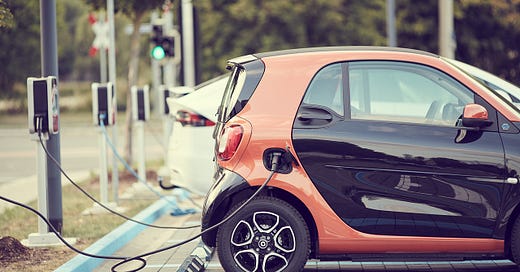Hi! I’m Ian Morse, and this is Green Rocks, a newsletter that doesn’t want dirty mining to ruin clean energy.
For this edition, I spoke with Dana Thompson. She researches lithium-ion batteries at the University of Leicester and Faraday Institution. Last month, she wrote about a emerging school of thought.
“I think it’s been around for a while, but no one’s acted on it,” she says.
The school of thought believes that manufacturers — Tesla, Nissan, Panasonic, etc. — should design batteries to be easily reused. Design for recycling, it’s called.
Most material products simply are not designed to be used again. Usually once goods enter the economy, they have just one fate: the trash heap or the ocean. That’s a tough starting point for this global push to produce and consume metal-heavy gadgets that are meant save our species from imminent climate crisis.
If all that metal gets a one-way ticket in and out of the economy, the green push will pile waste on one end and deplete our planet’s resources on the other. We’re already beginning to see the waste piling up, adding to the trash mountains already created and the actual mountains already destroyed.
This technology-centric solution means that in a decade or two, we’ll begin to see waves of EV batteries that have come to the end of their life. Those batteries are being built and sold right now. And those batteries are not designed to be recycled, Thompson says.
In general, current battery recycling works like this: shred it or burn it or melt it down, manage toxic pollutants, then isolate individual metals using other solutions. It may work best for small phone batteries, but It’s not very efficient for EVs, and the metals in the end aren’t very pure. Manufacturers end up preferring new metal from mines (or ‘virgin’ materials, to use a sexist term in some literature). All eyes are on battery performance, and recycling is left as an afterthought.
“I feel like that’s probably the main issue,” Thompson says, “that no one really cares about recycling at the minute, because obviously we already have stuff that works well. We only have a small volume of electric vehicles and not enough end of life batteries to be concerned about recycling. Then, who cares, you know?”
Yet, it could be a perfect time to talk about recycling for a few reasons.
As her paper describes, after focusing on performance for so long, the EV world is hitting crucial milestones. Some designs can already drive 300 miles straight and survive for several years. Some companies are even reviving old technologies. EV prices around the world have shrunk. Environmentalism can enter the chat.
The biggest economy in the world will have a leader that considers climate action one of its core goals. Policies could be on the way. There may be less reliance on mining to build clean energy tech.
Batteries sold today will end their lives (and second-use lives 🤞) in 20 years. That’s well after governments plan drastic overhauls of transportation. If those batteries cannot be easily recycled, they’ll become waste when everything else is getting greener.
There’s a lot of potential for batteries to be redesigned with a circular economy in mind.
Most lithium-ion batteries are like layered cakes, the icing being a kind of glue that is as much an engineering feat as the more widely known cathode, anode and electrolyte. In Tesla EV batteries, the layers are rolled up in an energy-dense coil that’s very difficult to unravel.
With simple labeling, like the safety information that is already required, recyclers can prepare for what’s inside a battery.
If the glue between components were easily dissolved (water may be an option!) then disassembly could be as easy as washing [heavy metal] dishes.
If recyclers knew the components, they may be able to design a process to deconstruct it. Companies sensitive to consumers demanding recyclability may invest in that themselves.
“Obviously manufacturers are always in competition with each other,” says Thompson. “No one is going to want to say, ‘oh let’s stop that and let’s start thinking about recycling,’ if it’s going to cost them money or lose them money.”
Thompson knows of just one company that has designed a battery for a circular economy. BYD in China earlier this year officially launched the ‘Blade Battery,’ whose structure may allow for easier disassembly. Only recently have EV manufacturers begun to see the severity of the battery recycling issue and invested in recycling plants.
The lithium-ion battery market is uniquely dynamic and can transform quickly. If a company simply decides to switch to a new battery, recyclers have trouble keeping up. Shredding the battery ends up being the best option.
One critical issue that policymakers will have to face soon is responsibility. Who needs to make sure that recycling happens? The consumer or the manufacturer? Thompson again:
“Is it my responsibility because I bought it or is it the manufacturer’s responsibility because they made it and are selling them? If it lied on the manufacturers, then obviously they would start thinking about how they’re going to do that and they could design it to be recycled.”
Recyclability could become a branding statement. And maybe, just maybe, consumers would prefer to choose greener batteries.
Eye on Industry
People in Ecuador are pushing officials to let them hold a referendum on mining before more companies are granted licenses. The country’s constitutional court had issued a historic ruling that allowed citizens to prevent mining through a referendum.
The Frieda River project in Papua New Guinea, which Green Rocks reviewed a few weeks ago, has seen its proposal for a tailings dam rejected. The mine may now propose dumping its waste in the ocean, a practice that has led to a lawsuit demanding the highest environmental damages in the history of the country.
Chile is considering a bill to protect glaciers in its high, water-scarce Andes mountains, but mining companies are concerned that it will prevent them from producing copper.
In the Solomon Islands near Papua New Guinea, government heeded local concerns and prevented a bauxite mine from digging up an island.


Citizens of the Cook Islands in the Pacific are pressing their government to take it slow on deep-sea mining and carry out transparent research before the country agrees to support mining licenses.
The Responsible Mining Foundation is urging a moratorium on deep-sea mining until its effects are better understood.
The conservation group IUCN — supported by 1400 government and nongovernmental groups — has called on the Ghanaian government to protect the globally significant Atewa Forest that is at risk of being mined for bauxite.
Tanzania is about to allow an Australian company develop its first rare earths mine.
A new report highlights the connections between military and mining — not only the cases where military have backed mining projects, but also the mining that feeds their products to the military industry.


Thanks for reading! I’m Ian Morse, and this is Green Rocks, a newsletter that doesn’t want dirty mining to ruin clean energy.
These topics are relevant to anyone who consumes energy. If you know someone like that, tell them to sign up!
Subscribe with just your email, and weekly reports with news round-ups and original reporting will come directly to your inbox. It’s free! (for now)







